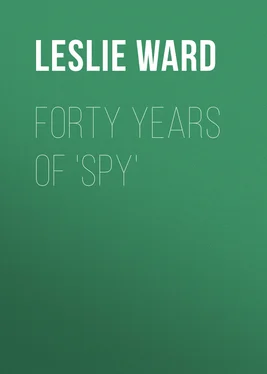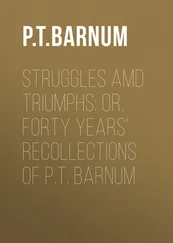Leslie Ward - Forty Years of 'Spy'
Здесь есть возможность читать онлайн «Leslie Ward - Forty Years of 'Spy'» — ознакомительный отрывок электронной книги совершенно бесплатно, а после прочтения отрывка купить полную версию. В некоторых случаях можно слушать аудио, скачать через торрент в формате fb2 и присутствует краткое содержание. Издательство: Иностранный паблик, Жанр: foreign_prose, foreign_home, visual_arts, на английском языке. Описание произведения, (предисловие) а так же отзывы посетителей доступны на портале библиотеки ЛибКат.
- Название:Forty Years of 'Spy'
- Автор:
- Издательство:Иностранный паблик
- Жанр:
- Год:неизвестен
- ISBN:нет данных
- Рейтинг книги:4 / 5. Голосов: 1
-
Избранное:Добавить в избранное
- Отзывы:
-
Ваша оценка:
- 80
- 1
- 2
- 3
- 4
- 5
Forty Years of 'Spy': краткое содержание, описание и аннотация
Предлагаем к чтению аннотацию, описание, краткое содержание или предисловие (зависит от того, что написал сам автор книги «Forty Years of 'Spy'»). Если вы не нашли необходимую информацию о книге — напишите в комментариях, мы постараемся отыскать её.
Forty Years of 'Spy' — читать онлайн ознакомительный отрывок
Ниже представлен текст книги, разбитый по страницам. Система сохранения места последней прочитанной страницы, позволяет с удобством читать онлайн бесплатно книгу «Forty Years of 'Spy'», без необходимости каждый раз заново искать на чём Вы остановились. Поставьте закладку, и сможете в любой момент перейти на страницу, на которой закончили чтение.
Интервал:
Закладка:
Of course the old house was the happy hunting ground of artists; the pictures were mostly fine although some of them were at one time in the hands of a cleaner, by whom they were very much over-restored. A clever artist (and a frequenter of Knole at that time for the purpose of making a series of studies) was Claude Calthrop (brother of Clayton Calthrop the actor and father of the present artist and writer Dion Clayton Calthrop). I was then just beginning to be encouraged to make architectural drawings, and I was making a sketch of the exterior of Knole House when one of the under gardeners came ambling by wheeling a barrow. He paused … put down the barrow, took off his cap … scratched his head and said to me, "Er … why waaste yer toime loike that … why not taake and worrk loike Oi dew!"
Another time when I was sketching in that neighbourhood, in rather a lonely part, I fell in with a gipsy encampment. One of the tribe, a rough specimen, of whom I did not at all like the look, was most persistently attentive. He asked a multitude of questions, about my brushes, paints, and materials generally—and seemed anxious as to their monetary value. As he did not appear to be about to cut my throat—and I felt sure he harboured no murderous intentions towards my painting—I began to feel more at ease, and when no comments after the style of my critic, the gardener, were forthcoming, it struck me that perhaps I had a vagrant but fellow beauty-lover in my gipsy sentinel. I wish now that I had even suggested (in view of his evident love of colour) his changing his roving career for one in which he could indulge his love of red to the utmost and more or less harmlessly.
When I was about sixteen I turned my attention to modelling, and in the vacation I started a bust of my young brother Russell. I spent all my mornings working hard and at length finished it. On the last day of my holiday I went to have a final glance at my work and found the whole thing had collapsed into a shapeless mass of clay. With the exception of watching sculptors work I had no technical knowledge to help me; but, not to be discouraged, I waited eagerly for the term to end, so that I might return to my modelling. When the time came, and my holidays began, I at once set to work again, taking the precaution to have the clay properly supported this time. Allowing no one to help me, I worked away strenuously, for I was determined it should be entirely my own. My bust was finished in time to send in to the Royal Academy, where it was accepted. I had favourable notices in the Times and other papers, which astonished and encouraged me, and I went back to school tremendously elated at my success.
Tom Taylor, then art critic of the Times , wrote to my mother, saying:—
Dear Mrs. Ward,
… I must tell you how much Leslie's bust of Wrio was admired by our guests last night—particularly by Professor Owen....
Later I started another bust of Kate Terry, but I was never pleased with it, as it did not do my distinguished sitter justice, and I resolved not to send it to an exhibition.
I did not follow up my first success in the paths of sculpture, for I still suffered slightly from my strain, and I came to the conclusion that it would prove too great a tax on my strength at that time if I took up this profession.
The stage claimed a great part of my attention about this time, and I became an inveterate "first-nighter" in my holidays. From the pit (for, except on rare occasions, I could not afford a more expensive seat), or when lucky enough to have places given me, I saw nearly all the popular plays of the day; and when Tom Taylor introduced my parents to the Terry family, I became more interested than ever, owing to the greater attraction of personal interest. I grew ambitious and acted myself, arranged the plays, painted the scenery, borrowing the beautiful costumes from my father's extensive historical wardrobe.
The first time I appeared before a large audience was at the Bijou Theatre, Bayswater, which was taken by a good amateur company called "The Shooting Stars," composed chiefly of Cambridge Undergraduates. We arranged two plays, and the acting of the present Judge Selfe was especially good, also that of Mr. F. M. Alleyne.
One night, when I came down from my dressing-room, made up in character to go on the impromptu stage, I complimented an old carpenter of ours, waiting in the wings, upon the clever way in which he had arranged the stage and the scenery.
"Oh yes, sir," he replied, very modestly, thinking I was a stranger, " I didn't paint the scenery, Mr. Leslie did that!"
In some theatricals at the Friths' house, when John Hare coached us, I took the part of an old butler. On my way to Pembridge Villas, attired ready for the stage, I remembered I needed some sticking plaster to obliterate one of my teeth; so leaving the cab at a corner, I entered a chemist's shop, where I was amused, because the assistant put me on one side rather rudely for other customers who came later, and after attending to them, addressed me roughly with a, "Now, what do you want?" His rudeness was an unconscious tribute to my effective disguise, and his manners altered considerably when I disillusioned him.
At one time Miss Marion Terry, who was then about to go on the stage, after witnessing my acting in a play of Byron's, suggested in fun and raillery at my enthusiasm that we should make our début together. Owing to her excessive sensibility and highly strung temperament, rehearsals were very trying to her at first, and for this reason her eventual success was in doubt. When one has seen her perform her many successful parts with such exquisite talent and pathos, one feels glad to realize that she finally overcame her nervousness, and that her gift of acting was not lost to the public.
I knew the Terrys very well then, and I was in love with them all; in fact, I do not know with which of them I was most in love.
Ellen Terry sat to my father for his picture of "Juliet," and Kate Terry for "Beatrice" in Much Ado . I remember too that when Ellen made her reappearance in the theatre, my mother lent our great actress a beautiful gold scarf, to wear in that part in which she fascinated us on the stage as fully as she did in private life. Among my cherished letters I find the following notes written to me at school, after her marriage to G. F. Watts.
1866.My Dear Leslie,
I am extremely obliged to you for your sketch and I'm sorry Alice [my sister] should be "riled" that I wanted a character of her, as the people down here call caricatures. Please give my love to her and to her Mama and to all the rest at Kent Villa—when you write. Mrs. Carr and Mr. Carr (my kind hostess and host) think the caricature is a capital one of me ! Polly [Miss Marion Terry] sends her love, and is awfully jealous that I should have sketches done by you and she not !! With kindest regards and best thanks, believe me, dear Leslie,
Sincerely yours, Ellen Watts.Dear Leslie,
I fulfil my promise by sending you the photo of my sister Kate, that you said you liked! I think it's the same. I hope you'll excuse it being so soiled, but it's the only one I have—the fact is, the Baby [her brother Fred] seized it, as it lay upon the table waiting to be put into a cover, and has nearly bitten it to pieces. I came up from Bradford, in Yorkshire, on Monday last, where I had spent a week with Papa and Polly, and I can't tell you, Leslie, how cold it was. I intend going to Kent Villa, as soon as possible. I've promised Alice a song of Mrs. Tom Taylor's and have not sent it to her yet, "Better late than never," tho' I really have been busy.
With my best regards, Sincerely yours, Nelly Watts.Those were delightful days spent with delightful companions. Lewis Carroll was sometimes a member of the pleasant coterie which met at our house in those days. My sister Beatrice was one of his greatest child friends, and although he always sent his MSS. for her to read, he disliked any mention of his fame as an author, and would abruptly leave the presence of any one who spoke about his books. The public at that time were in complete ignorance of the real identity of Lewis Carroll. Later in life, when I wished to make a cartoon of Mr. Dodgson for Vanity Fair , he implored me not to put him in any paper. Naturally, I was obliged to consent, but Vanity Fair extorted some work from his pen as a compromise. He was a clever amateur photographer, and in my mother's albums there are photographs taken by him of several members of the Terry family, together with some of us.
Читать дальшеИнтервал:
Закладка:
Похожие книги на «Forty Years of 'Spy'»
Представляем Вашему вниманию похожие книги на «Forty Years of 'Spy'» списком для выбора. Мы отобрали схожую по названию и смыслу литературу в надежде предоставить читателям больше вариантов отыскать новые, интересные, ещё непрочитанные произведения.
Обсуждение, отзывы о книге «Forty Years of 'Spy'» и просто собственные мнения читателей. Оставьте ваши комментарии, напишите, что Вы думаете о произведении, его смысле или главных героях. Укажите что конкретно понравилось, а что нет, и почему Вы так считаете.












